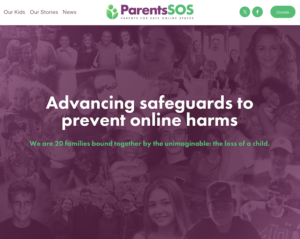A distressed colleague recently told me that social media is being used to allure and capture young children, pulling them into cartels who then traffic these children for the sex trade. How can this happen, and where are these children’s parents? Every time a child is handed a device and not supervised, they are at great risk for online corruption. Violent video games, pornography, bullying, and sexual exploitation are happening to our most vulnerable with precision and increasing frequency. Parents wouldn’t hand 2 year old a knife, yet without a second thought, hand them a far more harmful and extremely addictive device. While parents worry about gluten or too much sugar, their children are spending the majority of their waking hours lost in a virtual world devoid of all critical factors for development, behavior and learning.
Lacking necessary movement, touch, human connection, and nature, these “detached” children are increasingly referred to physicians for consequent problematic behaviours. Cut loose from their primary attachment figures, the parents, these children are drifting about on a sea of uncertainty, parental neglect, and no rules or structure needed to become socialized and self-reliant beings. Characterised by aggression and poor self-regulation, these often anti-social and developmentally delayed children are increasingly at risk for receiving mental health diagnoses such adhd, aspergers, autism, depression, anxiety, and bipolar disorders. Many are placed on dangerous psychotropic medication, resulting in risk of explosive violence or suicide. As parents and teachers struggle to manage these children, health, education, and social governments face funding shortfalls and impending financial crisis. This article profiles how parental technology obsession and addiction, and consequent neglect and detachment from children, is threatening 21st century child sustainability.
As soon as an infant is born into the world, their job is to form a functional attachment to the primary parent. This task increasingly involves competing with whatever device the parent is glued to…iPhone, tablet, TV, or computer. While Mom or Dad stare at their screens, Infant soon learns that in order to form this life sustaining bond, they too should repress their need for human connection, and also stare at a screen. Seeking eye contact and touch is not rewarded, but instead, what appears to please Mommy and Daddy is for Infant to become heavily engaged with their own screens. Parents reinforce this detachment by boasting to friends “look at how interested Infant in the screen”, as if this denotes some sort of intelligence or advanced skill, when really, Infant is trying their hardest to be and do whatever they know will provide them with an attachment bond. While really wanting parental affection and attention, Infant represses these needs, settling instead for an occasional glance or smile, kind word or kiss. As parental-infant detachment progresses, the infant becomes increasingly desperate and anxious to attach to something, anything, that will help them to fill the aching void left inside. As Infant anxiety builds, which by the way is the most diagnosed child “mental illness” today, so does problematic behaviors, sleep disorders, and chaos.
Enter the handhelds to the rescue….predictable, controllable, and immensely entertaining, the handheld becomes the default to the absent parent. Replacing functional attachment, both parents and children form unhealthy addictions with these seemingly surrogate human devices…and so begins life in the 21st century. Unfortunately, there is an immense cost to dehumanizing and mechanizing attachment, and that cost is borne by parents, teachers, and eventually society as a whole. The cost of detaching from children is immense, expensive, and virtually undetected by present day health, education, and social service professionals…but not for long, no, not for long.
Daycares, preschools, schools, after-school care facilities, and community centers are all struggling with managing these detached children, who appear to lack all social skills, can’t wait or take turns, cry constantly, tantrum, can’t sooth themselves, bully other children, and if they can speak intelligibly (many can’t at school entry), do so with defiance and disorder. These detached children are miserable, and seek comfort, everywhere, but trust no one, why should they? No one was ever there for them, and they had to learn very early how to fend for themselves, and fend they did. Fighting, pushing, punching, kicking, and swearing their way into the world is their norm, and they came by it rightly. Grand Theft Auto V is their game, and early pornography exposure their claim to fame. Even the girls get caught up in this ‘love trap’, craving the affection and attention denied to them at birth. Easy targets for sexual predation through social networking sites, predominantly Facebook, these girls are dropping like flies into the hands of sex trade cartels, netting their captors $1 million per year for a team of 5 girls. Trafficking in Persons (TIP) is a market that is now more lucrative than the gun or drug trade, and is growing exponentially. As exposure to porn is on average age six, with over half of 10 year olds active users, addiction develops, tolerance builds, and depravity increases. Turning to child porn and prostitution in the teen years, these youth are heading down a road that leads to eventual erectile dysfunction, depression and suicide.
Families are a “pack”, and when family members become isolated from each other, their pack can’t survive. Parents would be wise to sit down and discuss with each other and their children the level of family technology use, and consequent family disconnection. It’s time to stop individualizing a problem that is really systemic in origin e.g. it’s never the child who has the problem, it’s the parents and teachers who are handing children devices in place of life sustaining human connection and touch. In British Columbia, the Ministry of Education has re-named teachers with the term of “facilitator” stating that in the future, all learning will be online. This Ministry is setting in place an infrastructure to support mass firing of teachers, and movement toward replacement of teachers with computers. This initiative not only lacks sound judgement and research evidence, but is completely backward thinking and will ensure the decline of not only literacy and ability to learn, but also the decline of humanity as we used to know it.
Devices don’t teach, teachers teach. Devices don’t form functional attachments, parents do. It’s time to pull our heads out of our devices, and pay attention to our children. It’s already too late.




